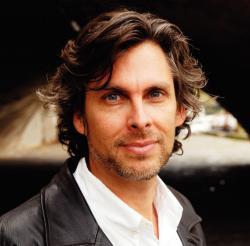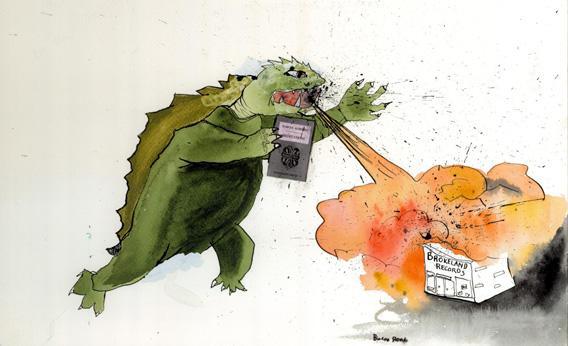Michael Chabon’s Telegraph Avenue—a novel about paternal failings and maternity wards and filial duty, about black vinyl and blaxploitation and black belts—is set in Oakland, Calif., in August 2004, not long after John Kerry accepted his party’s nomination at the Democratic National Convention in Boston. I direct your attention to the political calendar (inviting you to ride back in time on a magical Swift Boat or windsurfing board) to place in proper context a peculiarity of its story, a minor quirk pointing up the character of this handsomely composed, squishy-hearted fiction.
The book concerns the fate of a used-record shop, and it finds Chabon spiraling around the symbolism of the groove. At one point the store’s two co-owners, moonlighting as part of a three-piece band, play a gig at a Kerry fundraiser in the Berkeley hills. Just as they’re covering “Higher Ground,” the Illinois state senator who had given the DNC’s keynote speech makes the scene and—ripppppppp goes the narrative needle, pulled across the spinning album of the story. In the abrupt silence, the reader turns his head to see Barack Obama helping a major character toward an epiphany. Chabon places in Obama’s mouth a line about the importance of doing what you love for a living. The author intends us to take this small-talk truism straight, as if it were an ageless aphorism, or a very special public service announcement. I began to suspect that this buoyant novel, written with the author’s typical stylistic elegance and empathetic imagination, is high on hope—more smooth jazz than deep funk.
Its protagonist is Archy Stallings, who begins and ends his story on the road of the book’s title, where he runs Brokeland Records. The store’s name is a portmanteau indicating its precise neighborhood—“the ragged fault where the urban plates of Berkeley and Oakland subducted.” One of Chabon’s projects is to explore the copious sociocultural there there, at the zone where scrappy Oakland gives way to its soy-based neighbor. He examines the ragged fault—and, more frequently, the emotional cracks of persons living near it—with a fine eye for messy emotions.
In the best of times, Brokeland serves up platters of black music to a clientele you might politely call select. The situation becomes dire when Archy and his partner, Nat Jaffe, face the prospect of competing with a megastore owned by a superstar. Gibson Goode—a local son, a retired star quarterback, “the fifth richest black man in America,” and the owner of an imperial zeppelin casting a shadow across the promised land—intends to open a mall, anchored by a media store, around the way. Because Chabon has long been a vocal champion of genre fiction, the fact that Goode, an ostensibly shrewd media mogul, is building a retail outlet around “a full selection of … vintage vinyl recordings of jazz, funk, blues, and soul” may cause you to wonder if the author intends Telegraph Avenue as a work of fantasy.
Not quite. Telegraph Avenue is not exactly a genre novel, but it is manifestly a novel about genre, with Chabon offering sundry Vulcan salutes, lovingly crafting nods to supernatural classics, and referring to references to references to movies that weren’t very good. The arts under consideration include the martial type, and the author makes more mentions of kung fu than a Wu-Tang double album. Characters muse often on the filmography on Quentin Tarantino, particularly Kill Bill, in which Uma Thurman wears a yellow tracksuit modeled on the getup of Oakland’s own Bruce Lee in Enter the Dragon, as is herein duly noted. Indeed, no fewer than three scenes unfold “in the dojo of the Bruce Lee Institute.”
Tellingly, Chabon often employs Saturday-morning imagery when characters launch into furious physical action. A harried home cook searching his cabinets moves “like a dog in a cartoon, forepaws a turbine blur as he hunted up a buried bone.” A man spinning to deliver a blow gives “an impression of wind and gyration contained within a modest ambit, like the procedures of the Tasmanian Devil in cartoons.” The author manages to keep all his pop homage afloat by giving what is, in terms of rhythm and imagery, a highly Pynchonian performance, with his low-culture themes bobbing in the cascades of his paragraphs. (Chabon must be conscious of the influence. He is conscious of all influences, and anyway I cannot conceive of any other reason that a character here gets stoned on a strain of Cannabis indica cultivated in “Vineland County”—an administrative division not to be found in the Thomas Guide California Road Atlas.)
Archy is said to bear a noted “resemblance to Gamera, the giant mutant flying tortoise of Japanese cinema.” But he’s cuddlier than that, as he needs to be, given that the narrative asks us to give him our sympathy as he cheats on his heavily pregnant wife and struggles, just barely, to walk the righteous path. He meditates on The Meditations, “reading Marcus Aurelius for the ninety-third time.”
The Stoic drops wisdom. “When you wake up in the morning,” Aurelius says, “tell yourself: The people I deal with today will be meddling, ungrateful, arrogant, dishonest, jealous, and surly.” The most dishonest person Archy comes across may be Chandler Flowers, a city councilman abruptly in bed with Gibson Goode. The surliest is Archy’s estranged father, Luther Stallings, who decades earlier parlayed his kung fu skills into B-movie stardom and has long since gone to seed. Early on, a pair of superfly sequences set in 1973 reveal that Flowers, in a youthful phase of militant rebellion, shot a noisy drug dealer on behalf of the Black Panthers. Luther drove the getaway vehicle—and he now motors back, his old muscle car deteriorated into an awful jalopy, with blackmail in mind.
Archy is black and mutedly blue. Nat is white and sometimes gray with a mental fog. Chabon’s examination of cross-racial friendships is subtle. His schematic arrangement of his characters’ intertwined lives is not. Archy’s pregnant wife, Gwen, delivers the babies of the East Bay bourgeoisie with Nat’s wife, Aviva, famed as “the Alice Waters of Midwives.” Archy, it transpires, has abandoned a teenaged son who looks uncannily like Luther, and the kid, Titus, befriends Nat’s son, Julius, after they meet at a film class. (Its title: “Sampling as Revenge: Source and Allusion in Kill Bill.”) These parallels and trick mirrors contribute to the book’s odd lightness. Telegraph Avenue is so tidily structured and so often advanced by neat coincidence that—its serious consideration of regret and apology notwithstanding—it resembles a comic production. Does it count as a spoiler to say that the ending, despite its rueful undertone, is unaccountably happy? Archy earns reprieve without redemption, and Chabon, genial and generous as he is, lets most everyone off the hook.

Ulf Andersen/Getty Images.
His prose is as energizing as ever, in part because he’s always willing to try high-risk maneuvers up on the figurative balance beam; as a result, for every eight or nine tingling triumphs of language, there is a nasty fall to the mat. (Here is a baby crowning: “A smear of fluid and hair presented its credentials at this checkpoint, advance man for the imminently arriving ambassadress from afar.”) But Chabon’s missteps are more interesting than many writers’ bon mots, and the loveliness of the whole acts in the service of romancing adolescence, delivering gorgeous reveries for old records and paying homage to the old ways of the old days. The tone of things complicates the metaphorical richness of one character who plays a minor but crucial role—a memorabilia dealer operating an enterprise called Mr. Nostalgia’s Neighborhood.
The book’s naive outlook is at odds with its sophisticated verbal surface. Chabon has often been a softie; here, his chin-up optimism about the human race proves mostly ingratiating and totally unsupportable in light of what we know about real-life humans. His heart bleeds where you might want him to get some bile up; the man is too nice to attempt anything on the order of social satire. This is the opposite of a Tom Wolfe novel; the most Chabon will do is gently tease the local organic elite, describing a birth where the floor of a canyon home is covered in a Frida Kahlo shower curtain. Geography is destiny, Michael Chabon knows. So perhaps the most important phrase in the book comes at the end of the “About the Author” note: “He lives in Berkeley.”
—
Telegraph Avenue by Michael Chabon. Harper.
See all the pieces in this month’s Slate Book Review.
Sign up for the Slate Book Review monthly newsletter.
